

Free Software Foundation. Licenses libres et non libres (d'après la FSF) We try to list the most commonly encountered free software license on this page, but cannot list them all; we'll try our best to answer questions about free software licenses whether or not they are listed here.
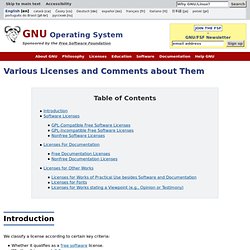
The licenses are more or less in alphabetical order within each section. If you believe you have found a violation of one of our licenses, please refer to our license violation page. If you have questions about free software licenses, you can email us at <licensing@fsf.org>. Because our resources are limited, we do not answer questions that are meant to assist proprietary software development or distribution, and you'll likely get an answer faster if you ask a specific question that isn't already covered here or in our FAQ.
We welcome knowledgeable volunteers who want to help answer licensing questions. If you are contemplating writing a new license, please also contact us at <licensing@fsf.org>. Open Source Initiative. The GNU Manifesto. The GNU Manifesto (which appears below) was written by Richard Stallman in 1985 to ask for support in developing the GNU operating system.
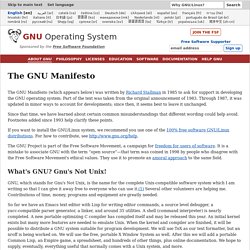
Part of the text was taken from the original announcement of 1983. Through 1987, it was updated in minor ways to account for developments; since then, it seems best to leave it unchanged. Since that time, we have learned about certain common misunderstandings that different wording could help avoid. Footnotes added since 1993 help clarify these points. If you want to install the GNU/Linux system, we recommend you use one of the 100% free software GNU/Linux distributions. The GNU Project is part of the Free Software Movement, a campaign for freedom for users of software. Free Software Song. Un article de Wikipédia, l'encyclopédie libre.
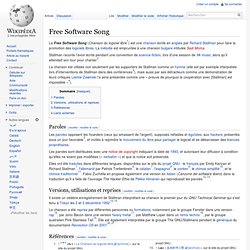
Stallman raconte l'avoir écrite pendant une convention de science-fiction, lors d'une session de filk music, alors qu'il attendait son tour pour chanter[2]. La chanson est utilisée non seulement par les supporters de Stallman comme un hymne (elle est par exemple interprétée lors d'interventions de Stallman dans des conférences[3]), mais aussi par ses détracteurs comme une démonstration de leurs critiques (Jamie Zawinski l'a ainsi présentée comme une « preuve de pourquoi la coopération avec [Stallman] est impossible »[4]). eGPL (Licence d'exceptions)
Licence eGPL. EXCEPTION GENERAL PUBLIC LICENSE Version 2, January 2009 DRAFT 7 - FOR FEEDBACK AND COMMENTS Copyright (C) 2009 Exception License Foundation Everybody is allowed to copy and distribute verbatim copies of this license document, but modifying it in any way is not allowed.
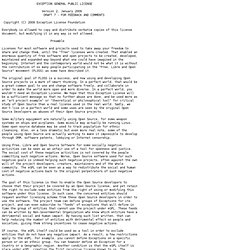
Preamble Licenses for most software and projects used to take away your freedom to share and change them, until the "free" licenses were created. That enabled an enormous quantity of free software and open projects to be created, developed, maintained and expanded way beyond what one could have imagined in the beginning. Internet and the contemporary world would not be what it is without the contribution of so many people participating in the "Free, Libre and Open Source" movement (FLOSS) as some have described it. The original goal of FLOSS is a success, and now using and developing Open Source projects is a mark of smart thinking. CeCILL. CeCILL and Free Software Today Free Software is important in the scientific community as well as in administrations and in the entreprise.
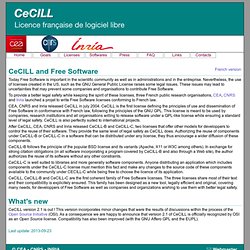
Nevertheless, the use of licenses created in the US, such as the GNU General Public License raises some legal issues. These issues may lead to uncertainties that may prevent some companies and organisations to contribute Free Software. To provide a better legal safety while keeping the spirit of these licenses, three French public research organisations, CEA, CNRS and Inria launched a projet to write Free Software licenses conforming to French law. CEA, CNRS and Inria released CeCILL in july 2004. After CeCILL, CEA, CNRS and Inria released CeCILL-B and CeCILL-C, two licenses that offer other models for developpers to control the reuse of their software. CeCILL-B follows the principle of the popular BSD license and its variants (Apache, X11 or W3C among others). CeCILL-C is well suited to libraries and more generally software components. Licenses CeCILL, CeCILL-B & CeCILL-C. Beerware. Un article de Wikipédia, l'encyclopédie libre.
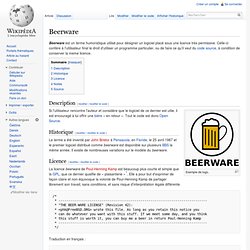
Beerware est un terme humoristique utilisé pour désigner un logiciel placé sous une licence très permissive. Celle-ci confère à l'utilisateur final le droit d'utiliser un programme particulier, ou de faire ce qu'il veut du code source, à condition de conserver la meme licence. Description[modifier | modifier le code] Exemple de logo. Si l'utilisateur rencontre l'auteur et considère que le logiciel de ce dernier est utile, il est encouragé à lui offrir une bière « en retour ». Historique[modifier | modifier le code] Le terme a été inventé par John Bristor à Pensacola, en Floride, le 25 avril 1987 et le premier logiciel distribué comme beerware est disponible sur plusieurs BBS la même année.
WTFPL - Do What The Fuck You Want To Public License. Creative Commons. Creative Commons France. Artlibre - Copyleft.